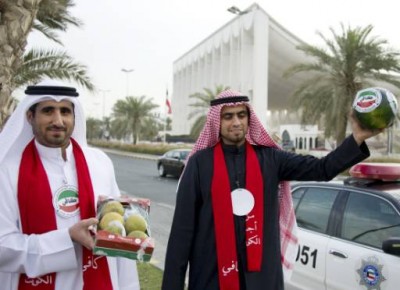Kuwaitis demonstrating outside parliament for the prime minister’s ouster came up with a new symbol of Arab discontent on Tuesday by handing out watermelons.

“This is for the parliament’s poor performance,” one of the small band of protesters shouted as he gave a watermelon to a lawmaker making his way into the parliament.
The significance was not spelled out, but in local parlance, a person who has a lack of understanding or holds an unrealistic point of view sometimes is called a watermelon.
In Libya, where protests against Muammar Gaddafi have descended into widespread violence, protesters threw shoes, which are considered unclean in the Arab world, at television screens showing the Libyan leader’s speech.
In Kuwait, six members of the Kuwaiti youth group Kafi , gave watermelons to a few lawmakers as a signal of their political dissatisfaction in a country that has the most outspoken parliament in the Gulf Arab region.
The demonstration marked a tempered start to a planned day of unauthorised protests by youth groups demanding the removal of Prime Minister Sheikh Nasser al-Mohammad al-Sabah, a member of the ruling family, and greater political freedom.
A potentially larger rally was expected later, inspired by spreading Arab protests that toppled leaders in Tunisia and Egypt before sparking the insurrection in Libya and spreading to other Gulf countries including Bahrain, Oman and Saudi Arabia.
Kuwait, the world’s fourth largest oil exporter, does not allow political parties, and its parliament is made up of individuals who form loose blocs.
Demonstrations are banned in Kuwait without prior approval and youth groups Kafi and al-Soor al-Khames , the main organisers, will present a challenge to the government since they had not sought permission for the protests.
Some of the protest organisers not only want Sheikh Nasser to step down, but seek a replacement from outside the al-Sabah family, which has ruled Kuwait for some 250 years.
The prime minister, a nephew of the ruler, has survived two non-cooperation motions in parliament since he was appointed in 2006. All other critical portfolios, such as defence, interior and foreign affairs, are held by al-Sabahs. The emir has the final say in all political matters.
Tension with stateless Arabs, longtime residents of Kuwait known as “bedoun” who clashed with police last month in protests demanding citizenship, appeared to be easing after some lawmakers promised to discuss a draft law in parliament on Tuesday that would grant them basic civil rights.

Leave a Reply
You must be logged in to post a comment.